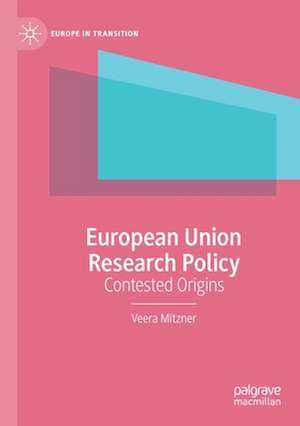European Union Research Policy: Contested Origins: Europe in Transition: The NYU European Studies Series
Autor Veera Mitzneren Limba Engleză Paperback – 2 iun 2021
| Toate formatele și edițiile | Preț | Express |
|---|---|---|
| Paperback (1) | 525.54 lei 6-8 săpt. | |
| Springer International Publishing – 2 iun 2021 | 525.54 lei 6-8 săpt. | |
| Hardback (1) | 530.94 lei 6-8 săpt. | |
| Springer International Publishing – 2 iun 2020 | 530.94 lei 6-8 săpt. |
Din seria Europe in Transition: The NYU European Studies Series
-
 Preț: 299.09 lei
Preț: 299.09 lei -
 Preț: 307.88 lei
Preț: 307.88 lei -
 Preț: 307.68 lei
Preț: 307.68 lei -
 Preț: 301.53 lei
Preț: 301.53 lei - 8%
 Preț: 538.69 lei
Preț: 538.69 lei - 15%
 Preț: 641.20 lei
Preț: 641.20 lei -
 Preț: 395.47 lei
Preț: 395.47 lei -
 Preț: 379.86 lei
Preț: 379.86 lei -
 Preț: 387.75 lei
Preț: 387.75 lei -
 Preț: 388.52 lei
Preț: 388.52 lei -
 Preț: 392.60 lei
Preț: 392.60 lei -
 Preț: 409.25 lei
Preț: 409.25 lei - 15%
 Preț: 698.62 lei
Preț: 698.62 lei - 15%
 Preț: 701.72 lei
Preț: 701.72 lei -
 Preț: 391.61 lei
Preț: 391.61 lei -
 Preț: 384.48 lei
Preț: 384.48 lei -
 Preț: 387.75 lei
Preț: 387.75 lei - 15%
 Preț: 639.41 lei
Preț: 639.41 lei - 15%
 Preț: 530.94 lei
Preț: 530.94 lei -
 Preț: 384.86 lei
Preț: 384.86 lei - 18%
 Preț: 786.66 lei
Preț: 786.66 lei -
 Preț: 388.72 lei
Preț: 388.72 lei -
 Preț: 386.99 lei
Preț: 386.99 lei - 14%
 Preț: 598.45 lei
Preț: 598.45 lei -
 Preț: 382.18 lei
Preț: 382.18 lei -
 Preț: 389.88 lei
Preț: 389.88 lei - 15%
 Preț: 644.18 lei
Preț: 644.18 lei -
 Preț: 389.88 lei
Preț: 389.88 lei -
 Preț: 386.39 lei
Preț: 386.39 lei -
 Preț: 390.25 lei
Preț: 390.25 lei -
 Preț: 388.72 lei
Preț: 388.72 lei -
 Preț: 421.93 lei
Preț: 421.93 lei -
 Preț: 388.72 lei
Preț: 388.72 lei -
 Preț: 389.70 lei
Preț: 389.70 lei -
 Preț: 386.81 lei
Preț: 386.81 lei -
 Preț: 387.38 lei
Preț: 387.38 lei - 5%
 Preț: 259.49 lei
Preț: 259.49 lei -
 Preț: 262.06 lei
Preț: 262.06 lei -
 Preț: 268.68 lei
Preț: 268.68 lei
Preț: 525.54 lei
Preț vechi: 618.27 lei
-15% Nou
Puncte Express: 788
Preț estimativ în valută:
100.56€ • 109.58$ • 84.74£
100.56€ • 109.58$ • 84.74£
Carte tipărită la comandă
Livrare economică 23 aprilie-07 mai
Preluare comenzi: 021 569.72.76
Specificații
ISBN-13: 9783030413972
ISBN-10: 3030413977
Pagini: 282
Ilustrații: XVIII, 282 p.
Dimensiuni: 148 x 210 mm
Greutate: 0.36 kg
Ediția:1st ed. 2020
Editura: Springer International Publishing
Colecția Palgrave Macmillan
Seria Europe in Transition: The NYU European Studies Series
Locul publicării:Cham, Switzerland
ISBN-10: 3030413977
Pagini: 282
Ilustrații: XVIII, 282 p.
Dimensiuni: 148 x 210 mm
Greutate: 0.36 kg
Ediția:1st ed. 2020
Editura: Springer International Publishing
Colecția Palgrave Macmillan
Seria Europe in Transition: The NYU European Studies Series
Locul publicării:Cham, Switzerland
Cuprins
1. Introduction.- Part I.- 2. Research for Growth: The Ideational Foundations of Research Policy in Postwar Europe.- 3. A Common Research Policy? Launching the Debate.- 4. Euratom: The Troubled Forerunner of Community Research Policy.- Part II.- 5. The Years of Questioning.- 6. COST: Distraction or Progress?.- 7. Contrasting Visions and Continuing Struggle.- Part III.- 8. The Return of the Gap.- 9. Research Policy: A Trailblazer for Institutional Change.- 10. Conclusion and Further Thoughts.
Recenzii
“Based on extensive archival research, Mitzner’s book understandably gives priority to the three powerhouses of European science (France, Germany, and the UK) … . Elegantly written and clearly structured, Mitzner’s book is fundamental reading for all those interested in science diplomacy and in the history of European integration.” (Francesco Cassata, ARO - Annali Rezensionen Online, Issue 6, January, 2023)
Notă biografică
Veera Mitzner is the Future Earth Network Lead at the Sustainability Innovation Lab at Colorado, the University of Colorado Boulder, USA, where she designs and leads global efforts to strengthen sustainability science and knowledge-based decision-making. She holds a PhD in History and Civilization from the European University Institute, Italy.
Textul de pe ultima copertă
This book describes the emergence of research policy as a key competence of the European Union (EU). It shows how the European Community (EC, the predecessor of the EU), which initially had very limited legal competence in the field, progressively developed a solid policy framework presenting science and research as indispensable tools for European economic competitiveness and growth. This book conveys the contested history of one of the EU’s most successful policies. It is a story of struggle and frustration but also of a great institutional and intellectual continuity. The ideational edifice for the EC/EU research policy that was put in place during the 1960s and 1970s proved remarkably robust. Its durability enabled the rapid take-off of the European Commission’s initiatives in the more favorable political atmosphere of the early 1980s and the subsequent expansion of the EU research funding instruments and programs that permanently transformed the European research landscape.Veera Mitzner is the Future Earth Network Lead at the Sustainability Innovation Lab at Colorado, the University of Colorado Boulder, USA
Caracteristici
Offers an original inquiry based on extensive archival research into the political history of EU research policy Highlights the influence of international political ideas on EU policy rather than focusing merely on national interests and European institutions Combines methods from political science and history to provide an innovative study targeted to researchers, students, practitioners, bureaucrats, and politicians
